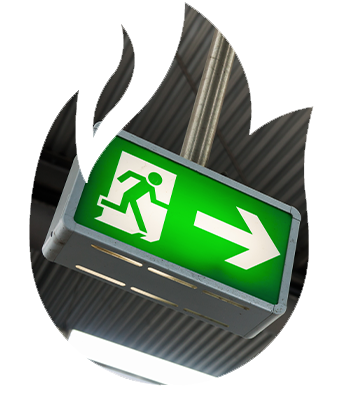Emergency Lighting
A Key Part Of Fire Safety Legislation
Emergency lighting is essential for landlords of large residential properties, such as HMOs, since it can, quite simply save lives. It’s also a key part of fire safety legislation for such premises, allowing residents to see instantly where their escape route is – even when the corridor may be smoke-filled.
But it’s not only landlords of residential properties that can benefit from our contemporary emergency lighting systems – commercial landlords can too, ensuring their employees can find their way out of a building in seconds, rather than minutes.
At Trident Fire we are a leading installer of emergency lighting in Norfolk and Suffolk, covering areas such as East Anglia, all the way down to Chelmsford. Our team of two are fully-qualified fire inspectors - each with 25 years of experience behind them, having worked with many of the national fire installation companies in the UK throughout their careers.

Same day repairs to keep you safe
Regardless of whether you’re looking for a large central battery system or a small self-contained unit, Trident Fire can design a bespoke emergency lighting system, using the latest LED lighting technology, for your individual needs.
We can then install it to ensure it is 100% effective (i.e it illuminates when the mains power isn’t in use).
Our emergency lighting systems are always in line with current British Standard 5266 Part 1 2016 and Part 8 2004, as well as being compliant with up-to-date fire safety legislation for landlords of residential and commercial properties, subject to the Regulatory Reform (Fire Safety) Order 2005.
Maintenance Plans
Following installation, we are happy to come back and maintain the system quarterly or every six months – whatever frequency you require. Once you choose, we will then alert you to when our visit is due so it’s one less thing as a landlord or residential letting agent that you have to worry about.
At Trident Fire we provide around-the-clock service, seven days a week, and respond to emergency call-outs within four hours.
